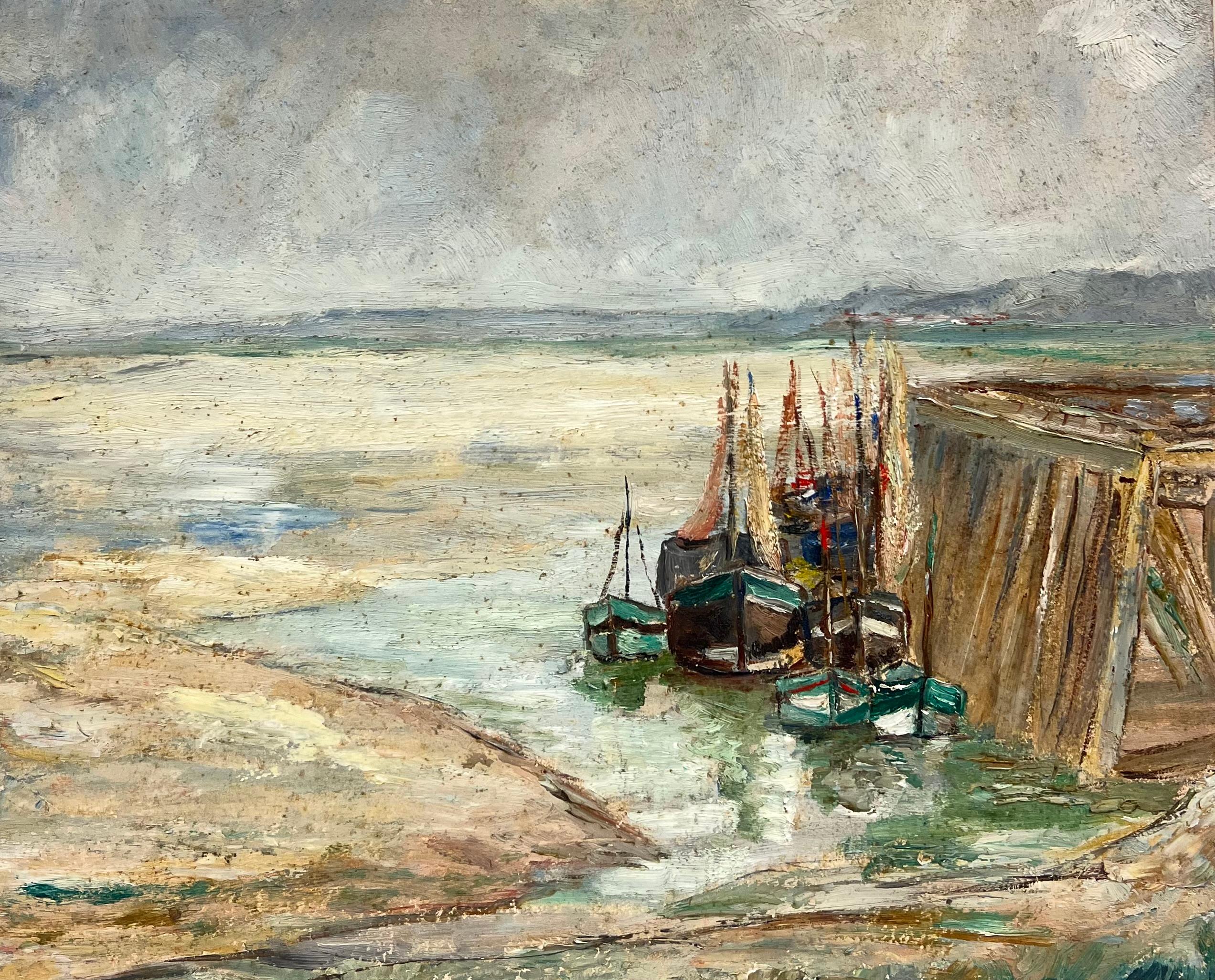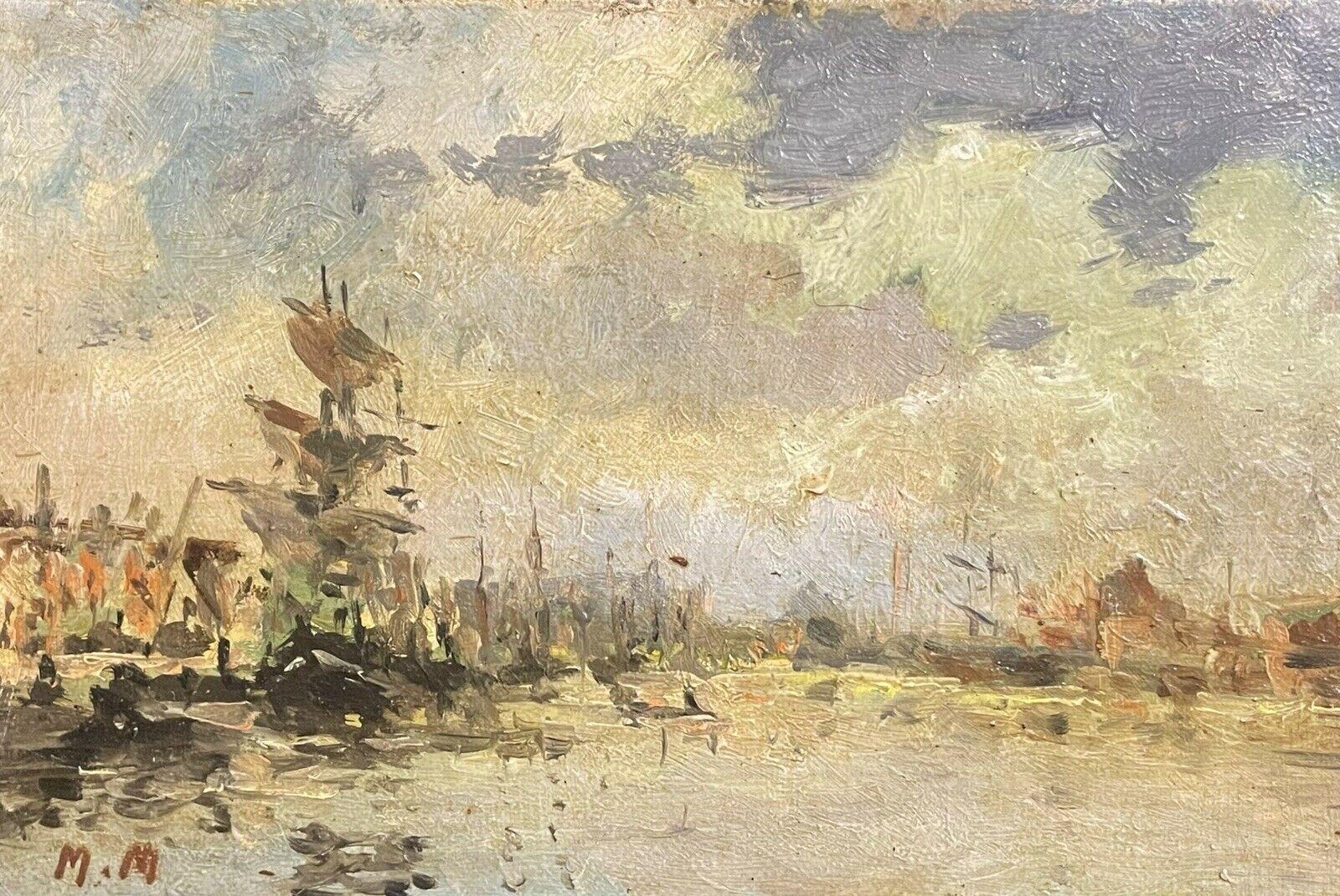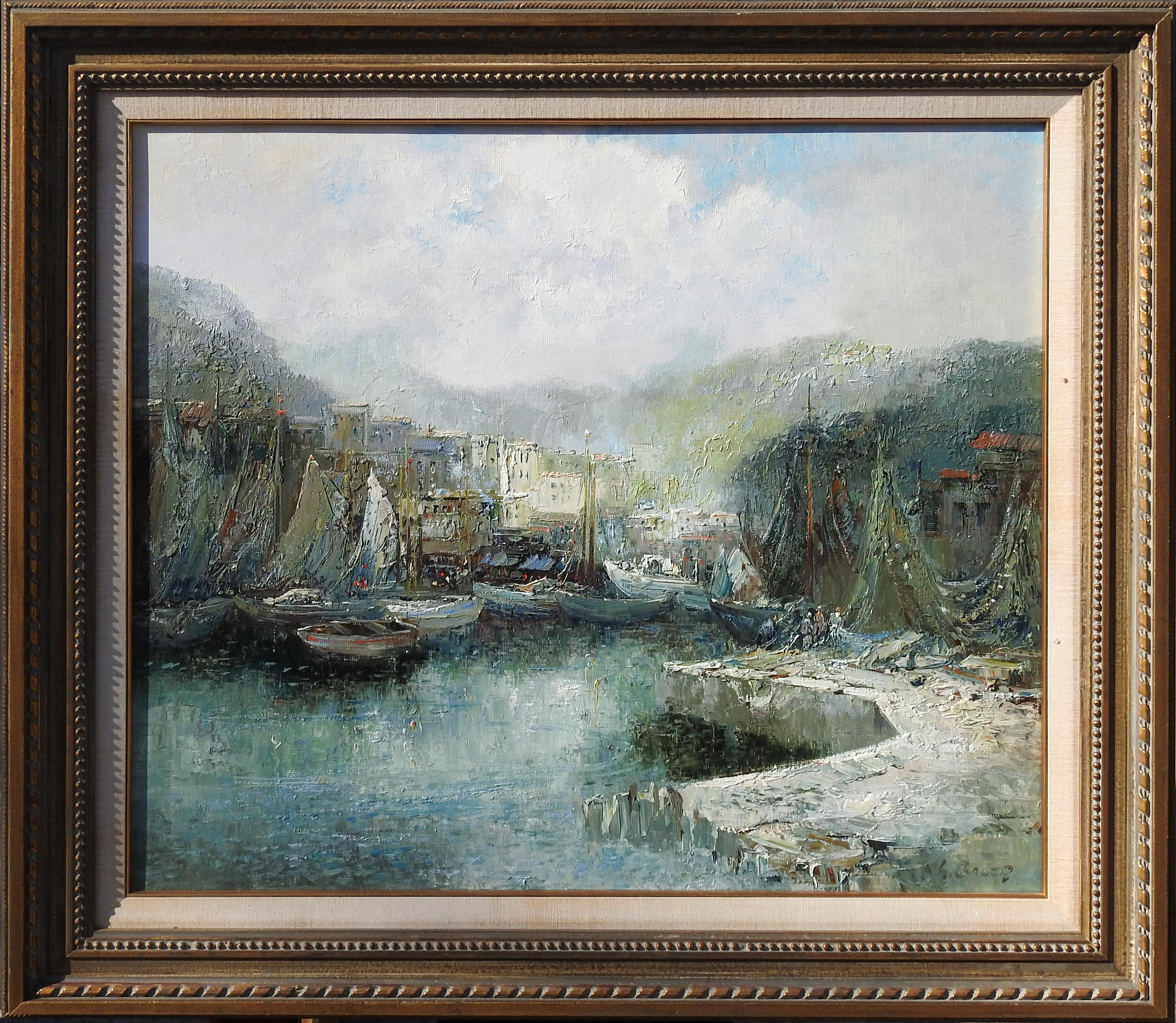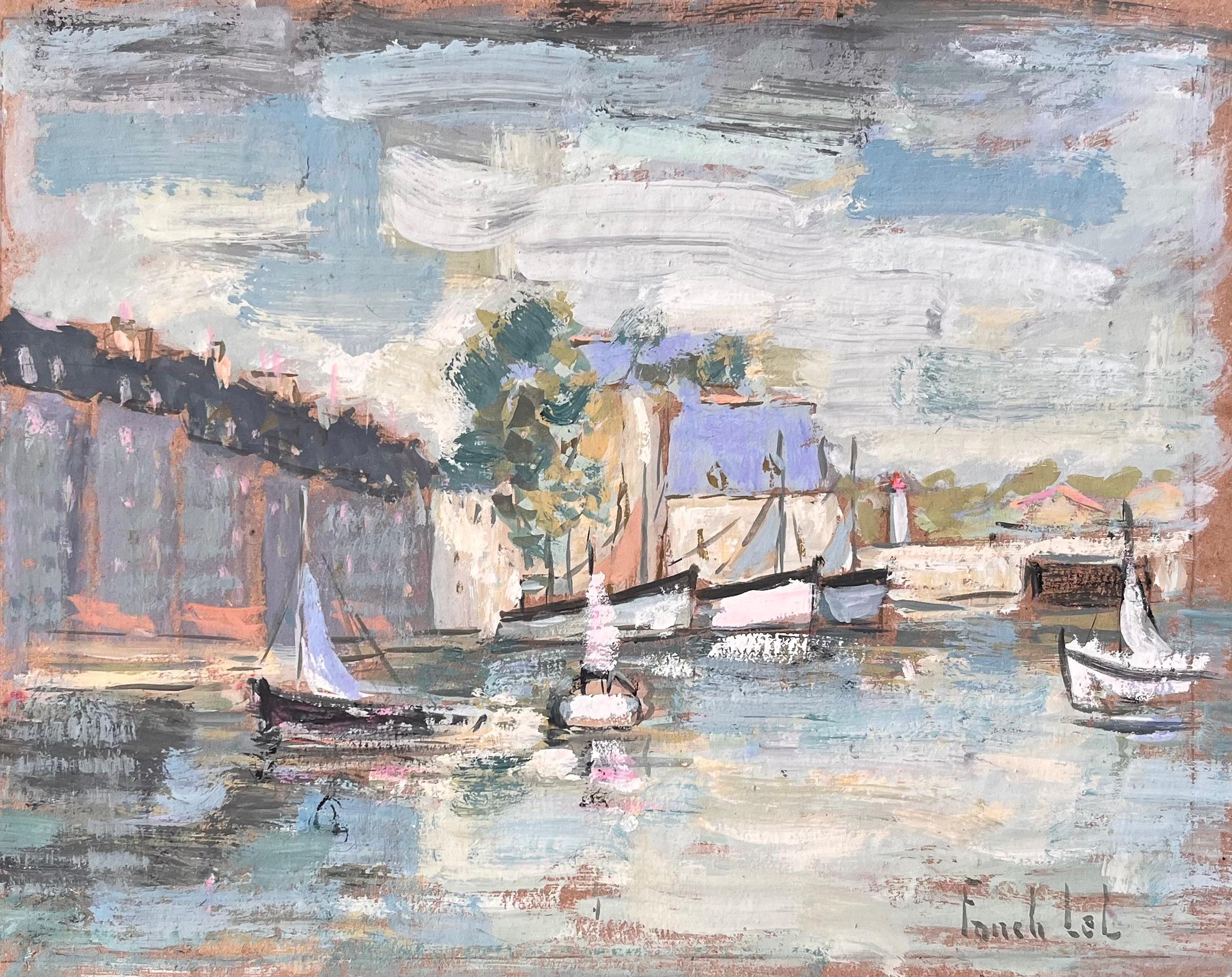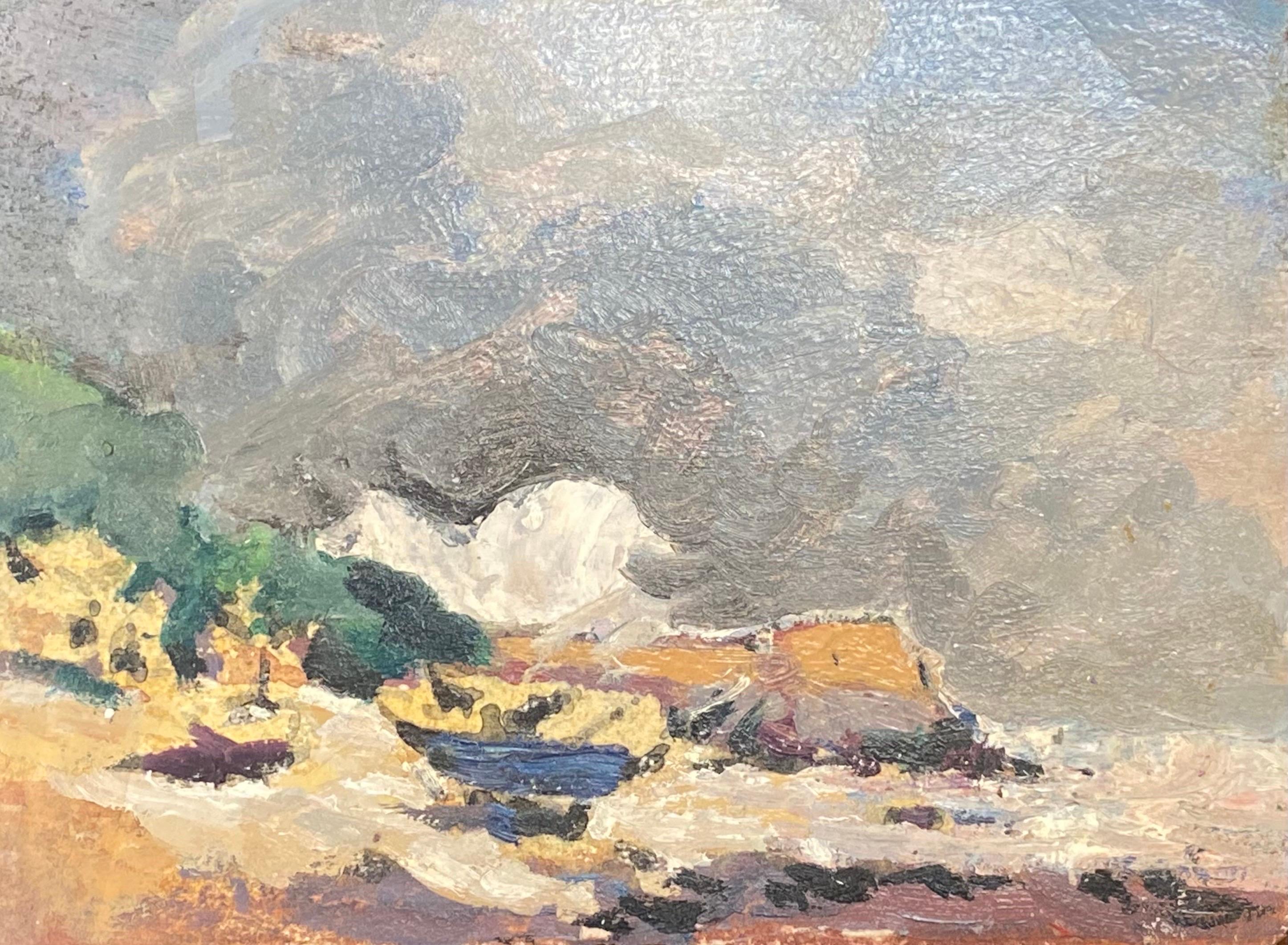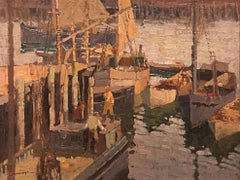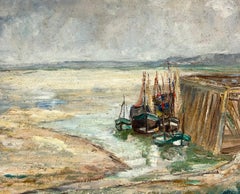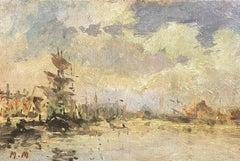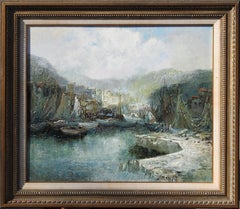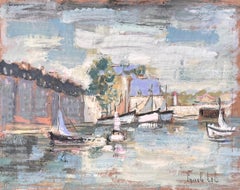Items Similar to Bateau au Quai (Docked Sailing Vessel at Low Tide), Frank Myers Boggs, Landscape
Want more images or videos?
Request additional images or videos from the seller
1 of 12
Frank Myers BoggsBateau au Quai (Docked Sailing Vessel at Low Tide), Frank Myers Boggs, Landscape
$6,800
$8,50020% Off
£5,164.77
£6,455.9620% Off
€5,940.43
€7,425.5320% Off
CA$9,500.93
CA$11,876.1720% Off
A$10,594.62
A$13,243.2720% Off
CHF 5,527.82
CHF 6,909.7720% Off
MX$129,999.92
MX$162,499.9020% Off
NOK 70,360.32
NOK 87,950.4020% Off
SEK 66,664.88
SEK 83,331.1020% Off
DKK 44,335.61
DKK 55,419.5120% Off
Shipping
Retrieving quote...The 1stDibs Promise:
Authenticity Guarantee,
Money-Back Guarantee,
24-Hour Cancellation
About the Item
Frank Myers Boggs
Bateau au Quai (Docked Sailing Vessel at Low Tide)
Signed lower left
Oil on canvas
15 x 21 1/2 inches
Provenance:
David Findlay Galleries, New York
Charles R. Brown Fine Art, Locust Valley, New York
The Impressionist Frank Myers Boggs spent his formative and mature years abroad and in 1923 became a naturalized French citizen. He was born in Springfield, Ohio, but moved as a young boy to New York, where his father was a newspaper executive. The artist began his career at the age of seventeen as a wood engraver for Harper’s, preparing illustrations for Harper’s Weekly and for an American edition of the works of Charles Dickens. It has also been stated that he studied with the portraitist John Barnard Whittaker (1836–1926).
After working at Niblo’s Garden in New York with a scene painter named Vauglin, Boggs went to Paris to study scene painting. On his arrival there in 1876, he was unable to find anyone to instruct him in this field and instead entered the École des Beaux-Arts. Realizing that Boggs was not well suited to painting figurative subjects, his teacher Jean-Léon Gérôme (1824–1904) advised him to try some outdoor landscapes. Between 1877 and 1881, he concentrated on marine pictures and harbor scenes in Dieppe, Honfleur, and Grandcamp. Views of architecture and street scenes also fascinated him, and he painted them throughout his career. In 1878 or 1879, Boggs returned to New York. He did much of this painting on Shelter Island and exhibited at the National Academy of Design. His progressive French style, however, was not well received and he soon left again for Paris. In 1880 he began to exhibit at the Salon, and within the next few years, his work was attracting attention both in Paris and London. In 1884, Theodore Child described Boggs as “one of the most successful and one of the most promising of the young American painters in Paris” and lamented that he was not better appreciated in his native land. That same year, the artist spent March and April in New York before leaving for Holland and England, where he continued to work on marine and harbor views.
By the late 1880s, Boggs was acquainted with the Impressionists Claude Monet (1840–1926), Alfred Sisley (1839–1899), Pierre Auguste Renoir (1841–1919), and Eugène Boudin (1824–1898), but his affinity for marine subjects, his use of a somber tonal palette, and restrained impressionist technique better reflect his admiration for the Dutch marine painter Johan Barthold Jongkind (1819–1891), whom he met in Paris at this time. In 1888, on the death of his parents, he returned to New York. He exhibited the following year at the Universal Exposition in Paris and then in 1890 made a trip to Algiers, which precipitated a number of sketches and paintings of Arab themes.
Throughout the next decade Boggs traveled extensively in Europe and frequently visited family in America. He exhibited at the Salon, at most of the international expositions, and in major cities at home and abroad. By 1903 he settled more into Parisian life and two years later moved into an elegant house on the rue de Biraque. He worked extensively in watercolors, many of which depicted architectural subjects, and in 1921 had his first exhibition of etchings. His health failed in 1923, and he died peacefully three years later in Meudon, southwest of Paris. Boggs was awarded the French Legion of Honor posthumously.
- Creator:Frank Myers Boggs (1855-1926, American)
- Dimensions:Height: 23 in (58.42 cm)Width: 30 in (76.2 cm)
- Medium:
- Movement & Style:
- Period:
- Condition:
- Gallery Location:New York, NY
- Reference Number:1stDibs: LU1841212654192
Frank Myers Boggs
Frank Boggs was a master of cloudy skies in landscape paintings, but was more strongly attracted to the soft light of misty mornings and rainy afternoons than the brilliant sunlight of his Impressionist peers. Contemporary American critics tended to view Boggs as an Impressionist, especially when he exhibited in New York early in his career. But although his brush became loose and free and his palette lightened as he matured, the artist never completely adopted Impressionistic methods. He was known and appreciated for delicate and subtle harmonies of blue, gray and green. In this respect, his style has sometimes been compared to the Tonalism of James McNeill Whistler. Boggs was born in Springfield, Ohio, on December 6, 1855. While still young, he was brought to New York City where his father was a newspaper executive. At age seventeen he took his first job, as a wood engraver at "Harpers" magazine. At age twenty-one, he decided to go to Paris to study stage design, having received encouragement from a French designer whom he had met. Finding, however, no one in Paris to instruct him in his newly chosen profession, he enrolled at the Ecole des Beaux-Arts, where he studied painting under Jean-Léon Gérome. In 1923 Boggs became a French citizen. Three years later, preparations were underway to award him the Legion of Honor. When informed of this coveted recognition by his adopted country, he expressed great delight. Sadly, Frank Meyer Boggs died, however, the day before the award was made public on August 8, 1926.
About the Seller
5.0
Platinum Seller
Premium sellers with a 4.7+ rating and 24-hour response times
Established in 2022
1stDibs seller since 2022
110 sales on 1stDibs
Typical response time: <1 hour
- ShippingRetrieving quote...Shipping from: New York, NY
- Return Policy
Authenticity Guarantee
In the unlikely event there’s an issue with an item’s authenticity, contact us within 1 year for a full refund. DetailsMoney-Back Guarantee
If your item is not as described, is damaged in transit, or does not arrive, contact us within 7 days for a full refund. Details24-Hour Cancellation
You have a 24-hour grace period in which to reconsider your purchase, with no questions asked.Vetted Professional Sellers
Our world-class sellers must adhere to strict standards for service and quality, maintaining the integrity of our listings.Price-Match Guarantee
If you find that a seller listed the same item for a lower price elsewhere, we’ll match it.Trusted Global Delivery
Our best-in-class carrier network provides specialized shipping options worldwide, including custom delivery.More From This Seller
View All"A Devon Harbor" William Lee Hankey, Coastal Town Seascape with Boats, England
By William Lee Hankey
Located in New York, NY
William Lee Hankey
A Devon Harbor
Signed lower right; titled on the stretcher
Oil on canvas
24 x 29 inches
William Lee Hankey (1869–1952) RWS, RI, ROI, RE, NS[clarification needed] ...
Category
Early 20th Century Impressionist Landscape Paintings
Materials
Canvas, Oil
$7,600 Sale Price
20% Off
"Gloucester Boats" Frederick Mulhaupt, Impressionist Gloucester Scene
Located in New York, NY
Frederick John Mulhaupt
Gloucester Boats
Signed lower left
Oil on board
12 x 16 inches
Born in Rock Port, Missouri, in 1871, Mulhaupt studied...
Category
Early 20th Century American Impressionist Figurative Paintings
Materials
Oil, Board
"Irvine Harbour" James MacMaster, Scottish Seascape, Marine Ship Painting
By James MacMaster
Located in New York, NY
James MacMaster
Irvine Harbour
Signed lower right
Watercolor on paper
10 1/4 x 14 inches
Provenance:
Private Collection, New Jersey
Category
Late 19th Century Landscape Paintings
Materials
Paper, Watercolor
$540 Sale Price
70% Off
"Soir de Novembre, Dordrecht, " Eugene Vail, Dutch Landscape with Boats, Cloudy
By Eugène Lawrence Vail
Located in New York, NY
Eugène Laurent Vail (1857 - 1934)
Soir de Novembre, Dordrecht
Oil on canvas
19 1/4 x 25 3/4 inches
Signed lower left; titled in two places on the stretcher with various other inscriptions, stamped "MADAME G:VAIL A" and inscribed "177" in ink and "#43" in pencil on a partial label from Garde-Meuble Maple affixed to the stretcher
Eugene Vail (Saint-Servan, France September 29, 1857 - Paris, December 28, 1934), the son of a French mother and an American father, Lawrence Eugene Vail, studied at the Stevens Institute of Technology in Hoboken, New Jersey (where Alfred Stieglitz was born in 1864) and graduated with a degree in mechanical engineering in 1877. Then he became a student of William Merritt Chase and J. Carroll Beckwith at the Art Students League before returning to France. He entered the Ecole des Beaux-Arts in 1882 where he was instructed by Alexandre Cabanel, Raphaël Collin, and Dagnan-Bouveret (1852-1929), known as an extreme naturalist. When Bastien-Lepage died in 1884, Dagnan-Bouveret became the leader of the Naturalist School. He definitely made an indelible impression on Vail.
According to Louise Cann, Vail soon became an independent painter working at Pont-Aven and Concarneau. It is difficult to determine when he separated from his teachers since he is listed as a student whenever he exhibited at the Paris Salon — that is, until 1899 when he dropped the mention of élève. A picture of a peasant girl, Seulette was his Salon debut painting in 1883, the same year that he sent two scenes of Brittany to the Pennsylvania Academy of the Fine Arts' exhibition, which documents his stay in that region.
The next year he exhibited in the Salon: Fishing Port, Concarneau, which went to the Luxembourg Museum (it is now in the Musée Municipal of Brest). It has the Naturalist brown and gray palette and tonalist atmosphere but already shows that Vail had direct experience with scenes of life in coastal villages: "So convincing was his familiarity with the French coast that the critic Thiébault-Sisson claimed him as a Frenchman and declared that no American marine painter could touch his skill." (Maureen C. O'Brien, in Blaugrund, 1989, p. 218).
In 1885, Vail exhibited Inner Port at Dieppe and in the following year On the Thames (Private collection), which later won him the Grand Diploma of Honor from an international jury in Berlin in 1891. Widow, the title of Vail's entry in the Salon of 1887 (unlocated), is a striking image of a woman standing on a beach, looking out to the expanse of the ocean where her husband obviously met his end. The innocent child who looks at us may have the same fate in store for him. Then in 1888, Vail completed his masterpiece, Ready, About! a "wall-size" 94 x 125½ inch canvas. The painting won a first-class gold medal in the Salon of 1888, then at the Paris Universal Exposition of 1889, Vail won another gold medal.
The first precedent that comes to mind is Théodore Géricault's colossal Raft of the Medusa of 1819 (Louvre), the celebrated romantic image of castaways about to be rescued after being lost at sea. But while Géricault presents a massive, sculpturesque group of figures struggling on a raft just beyond our designated viewing space, Vail pulls the viewer into the picture, or more exactly, extends the diagonally rocking boat into the spectator's area, vividly anticipating the effects of cinematography. There is no more effective way to engage the spectator's attention and sympathies, and the illusionism is especially effective in this life-size picture.
Vail's vigorous brushwork — a uniform use of rectangular strokes — adds to the motion-filled, dynamic actuality of this image, and the overall green-gray tonalities evoke the constantly menacing, cold and wet travails in the life of the fishermen in the Atlantic's rough waters. Theodore Child (1889, p. 518) wrote about this painting: "very beautiful in color, and amongst the very strongest and best pictures of this kind in the Exhibition."
Dordrecht (unlocated) was Vail's painting exhibited at the Pennsylvania Academy in 1892, and in the following year he showed Fisherman — The North Sea at the Paris Salon, the same year in which he re-exhibited Dordrecht and On the Thames at the World's Columbian Exposition in Chicago. Vail won the coveted Légion d'Honneur in 1894. Some of his paintings found their way to European museums, for example, Soir de novembre (Odessa Museum) and Soir de Bretagne (Museo d'Arte Moderna, Venice). The latter was exhibited at the Exposition Universelle of 1900 in Paris. Also there was Voix de la mer (Voices of the Sea), which we identify as the painting that appears in an interior view of the American section, just to the right of a doorway (fig. 20 in Fischer, 1999), a simple marine painting.
Some time after 1900, Vail turned to both impressionism and post-impressionism but no one seems to have charted this course. His Autumn near Beauvais, illustrated in International Studio (1902, p. 211), The Flags, St. Mark's Venice (1903; National Gallery of Art), and Grand Canal, Venice, ca. 1904 (Museum of Art, Rhode Island School of Design) demonstrate an impressionist technique with broken color. Mandel (1977, p. 202) wrote on the latter: "applied in short strokes juxtaposing brilliant hues of orange, blue, white, black and red, with a strong interplay between the warm pink tones of the walls and the green shadows of the black boats which are silhouetted against them." Cann (1937) believed that in Venice, Vail "found his true self." The Flags forecasts the Armistice Day pictures by Hassam and others, painted fifteen years later.
Vail became involved in the Society of American Artists in Paris and the Société Internationale de Peinture et de Sculpture, whose membership included Frank Brangwyn, Charles Cottet (1863-1924), the famous Naturalist sculptor Constantin Meunier (1831-1905), Frits Thaulow...
Category
Early 20th Century American Impressionist Landscape Paintings
Materials
Canvas, Oil
"Reflections, " Alexander Bower, Boats on the Water, American Impressionism View
By Alexander Bower
Located in New York, NY
Alexander Bower (1875 - 1952)
Reflections, Motif No. 1, Rockport, Massachusetts
Oil on canvas
22 x 18 inches
Signed lower right; titled on the stretcher
An American Impressionist, Alexande Bower was born in New York, studied at The Pennsylvania Academy of Fine Art, and was living with his wife in Cliff Island, Maine by 1914. Despite his urban upbringing, the coast and the sea fascinated Bower. A large portion of his paintings are seascapes, particularly scenes depicting the coast of Cape Elizabeth...
Category
Early 20th Century American Impressionist Landscape Paintings
Materials
Canvas, Oil
"Gray Morning" James MacMaster, Scottish Seascape, Marine Ship Landscape
By James MacMaster
Located in New York, NY
James MacMaster
Gray Morning
Signed and titled lower left
Watercolor on paper
10 1/4 x 14 inches
Provenance:
Private Collection, New Jersey
Category
Late 19th Century Landscape Paintings
Materials
Paper, Watercolor
$540 Sale Price
70% Off
You May Also Like
Harbour at Low Tide with Boats by the Pier 1930's French Impressionist
Located in Cirencester, Gloucestershire
Low Tide Boats
Simone Forge 1930's French Impressionist
oil on board unframed
board: 13 x 16 inches
Provenance: private collection
Condition: great condition
For more any more in...
Category
Early 19th Century Impressionist Landscape Paintings
Materials
Oil
MAURICE MAZEILIE FRENCH IMPRESSIONIST SIGNED OIL - TALL SHIP IN FRENCH HARBOUR
By Maurice Mazeilie
Located in Cirencester, Gloucestershire
"Anchored in Harbour"
by Maurice Mazeilie (French)
oil painting on canvas, unframed, signed with initials
painting: 6.25 x 9.25 inches
A delightful original oil painting by the 20...
Category
1990s Impressionist Landscape Paintings
Materials
Oil
"Docked at the Bay", Willi Bauer, Oil/Canvas, 27x31, Impressionist Cityscape
By Willi Bauer
Located in Dallas, TX
Willi Bauer is a contemporary German painter known for his Impressionist-styled depictions of garden parties and rustic villages. His paintings are composed of all aspects of life fr...
Category
1980s Impressionist Landscape Paintings
Materials
Canvas, Oil
French Impressionist Harbour Scene with Sailboats and Quayside Architecture
By Fanch Lel
Located in Cirencester, Gloucestershire
Title: French Impressionist Harbour Scene with Sailboats and Quayside Architecture
By Fanch Les
Signed: Yes
Size: 12.25 x 16.25 inches (height x width)
Oil painting on cardboard, un...
Category
20th Century Impressionist Landscape Paintings
Materials
Oil
Boat Dock, Impressionist Oil Painting on Masonite by Eugene Stevens
Located in Long Island City, NY
Artist: Eugene Stevens, American (1882 - 1959)
Title: Boat Dock
Year: circa 1950
Medium: Oil on Masonite, signed l.l.
Size: 14 x 18 in. (35.56 x 45.72 cm)
Category
1950s American Impressionist Landscape Paintings
Materials
Oil
MAURICE MAZEILIE-FRENCH IMPRESSIONIST OIL - Boat Landscape
By Maurice Mazeilie
Located in Cirencester, Gloucestershire
"Oil Beach Scene"
by Maurice Mazeilie (French)
oil painting on thin canvas paper, unframed
stamped verso
painting: 5.5 x 7.25 inches
A delightful or...
Category
20th Century Impressionist Landscape Paintings
Materials
Oil
More Ways To Browse
Claude Home
Monet Style Landscape
Dock Scenes
Antique French Newspaper
Ohio Impressionist
Sailing Vessel
Antique Native American Painting
Antique Sailing Painting
Marine Paintings New England
Death Valley Painting
Shelter Island Art
19th Century Paris Street Scene
French Sailing Painting
Paintings Honfleur
Dutch Marine Paintings
Monet Etching
Claude Renoir
Dutch Boy
